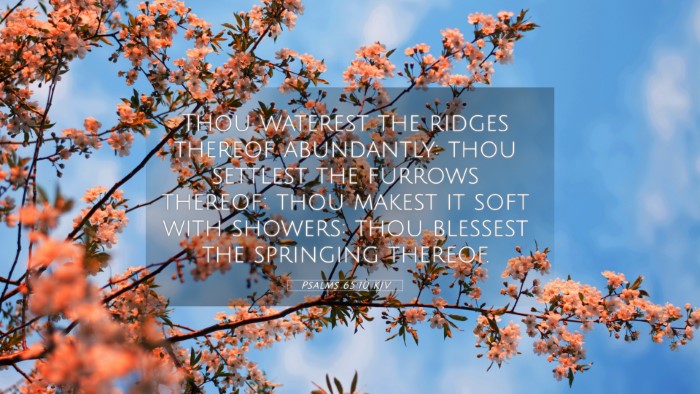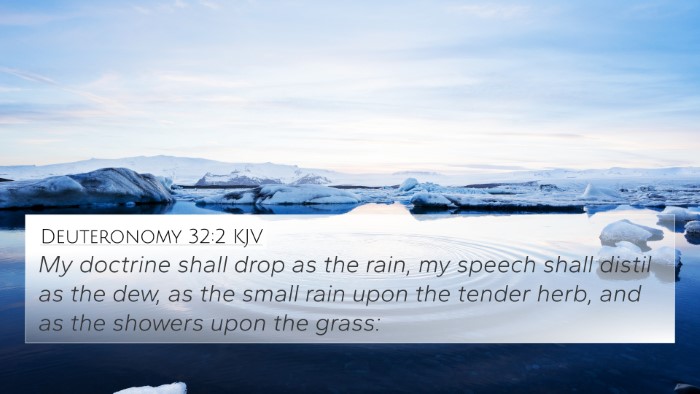Understanding Psalms 65:10
Bible Verse: Psalms 65:10
Verse: "Thou dost water the ridges thereof abundantly: thou settlest the furrows thereof: thou makest it soft with showers: thou blessest the springing thereof."
Overview of the Verse Meaning
This verse from Psalms beautifully portrays God's providential care in providing for the earth and its inhabitants. It reflects on the natural cycles of water and growth, illustrating how God's blessings are essential for abundance and prosperity. The imagery of watering the ridges, settling the furrows, and softening the soil evokes a sense of divine nurture, emphasizing God’s role as both creator and sustainer.
Insights from Public Domain Commentaries
-
Matthew Henry:
Henry emphasizes God's governance over nature, noting that the act of watering the ridges is not merely an event but a continual act of divine maintenance. The earth's productivity is a direct result of God’s gracious hand. This commentary also points out that the difficulties in farming reflect spiritual truths about reliance on God’s grace for spiritual growth.
-
Albert Barnes:
Barnes elaborates on the agricultural significance of the verse, highlighting that each element—water, furrows, showers—serves a specific purpose in the process of growth. He connects the physical sustenance provided by God with the spiritual nourishment found in His Word, drawing parallels between nature and the soul’s need for divine care.
-
Adam Clarke:
Clarke recognizes the poetic nature of this passage, attributing it to a time when Israel relied heavily on agricultural cycles. He discusses how the reference to "blessing the springing" can relate not only to physical harvest but also to the flourishing of righteousness in the lives of believers who trust in God for their needs.
Connections to Other Bible Verses
Psalms 65:10 can be understood more fully by examining its connections to other scriptures. Below are some notable cross-references:
- Psalms 65:9: This verse precedes verse 10 and sets the context of God’s provision.
- Isaiah 55:10-11: Compares the nurturing power of water to the effectiveness of God's Word.
- Matthew 5:45: Jesus illustrates God's impartial care for creation, akin to the nurturing described in Psalms.
- James 5:7: Discusses the benefits of patience in waiting for divine provision, paralleling the agricultural theme.
- Psalms 147:8: Reflects on God's provision for the earth and its creatures, complementing the themes in Psalms 65.
- Ecclesiastes 3:1: This verse emphasizes there is a time for everything, including agricultural cycles, linking to the timing of God's provision in Psalms.
- Isaiah 36:12: In reference to how provisions are wisely managed, showcasing stewardship over God's creations.
- 1 Corinthians 3:6-7: Paul discusses planting and watering in relation to spiritual growth, reflecting the natural processes described in Psalms.
- Hosea 10:12: The call for sowing righteousness can be seen as a parallel to God’s blessing for the yield that follows His care.
- Jeremiah 14:22: Questions regarding effective prayer emphasizing reliance on God for seasonal rain and blessings.
Thematic Connections
This verse encapsulates several themes found throughout the Bible, making it a fertile ground for thematic exploration:
- Divine Provision: God's continual support and nourishment is a recurrent theme in scripture.
- Nature and Spiritual Growth: Many scriptures draw analogies between the natural world and spiritual truths.
- Gratitude for Creation: Recognizing God’s work in nature often leads to a deeper appreciation of His gifts.
- God’s Sovereignty: The care evident in nature underscores God's overarching control and authority over all creation.
- Seasons of Life: The cyclical nature of seasons parallels the spiritual journeys of believers.
Tools for Cross-Referencing
For those seeking to deepen their understanding through cross-referencing, various tools can assist:
- Bible Concordance: An essential resource for finding specific verses and their connections.
- Cross-Reference Guides: Handy tools that provide a quick lookup for related verses.
- Online Bible Study Tools: Many websites offer searchable databases for exploring biblical connections.
Conclusion
Psalms 65:10 is more than just a reflection on agriculture; it serves as a reminder of God's providence and the intertwined nature of physical and spiritual sustenance. As we consider this verse, we are called to acknowledge the blessings that come from above and the responsibility we hold to nurture our relationship with God through faith, prayer, and scriptural engagement.





